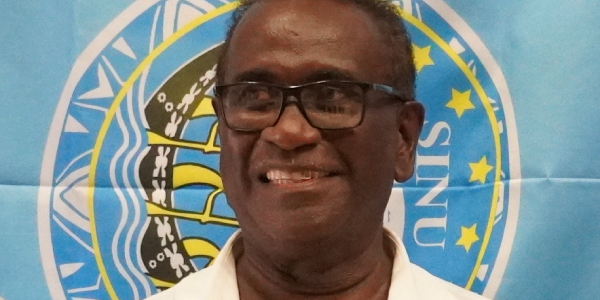Education is the foundation upon which any development strategy is built on.
Vice Chancellor of Solomon Islands National University (SINU), Professor Dr. Transform Aqorau stressed this during the Solomon Islands Government and Development Partners Round Table meeting at Heritage Park Hotel on Wednesday this week.
Ministry of National Planning and Development Coordination (MNPDC) has organized the meeting aimed at strengthening collaboration and aligning support with national development priorities.
The theme of the meeting was “Developing the Solomon Islands through Genuine and Durable Partnerships.”
As part of the Government for National Unity and Transformation (GNUT)’s 100-day policy launched in June 2024, the Ministry has been tasked with ensuring that programs that are funded by development partners align closely with the National Development Strategy (NDS) 2015-2035 and GNUT policy priorities.
Dr Aqorau said in Solomon Islands, they must critically assess the role of education in shaping our future.”
He said the education system, through improving, faces numerous challenges including lack of qualified teachers, inadequate infrastructure, and limited access to secondary and tertiary particularly in rural areas.
“A critical aspect of education in the Solomon Islands should be in the integration of indigenous knowledge systems with modern curricula.
“Our country has a rich tradition of knowledge that has been passed down through generations.
“By incorporating plan-based learning, we can create a system that respects and leverages while equipping students with the skills needed to participate in the global economy.”
He said SINU is committed through initiatives like Centre for islands future and proposed Centre for Linguistics in partnership with the Kulu language institute.
“These initiatives will support the Ministry of Education in training teachers who can in the vernacular, thereby promoting the preservation of our indigenous languages and enriching the educational experience for future generations.”
He pointed out that institutes like SINU are pivotal in fostering such integrated learning approaches that honor the cultural heritage while embracing modern development.
Transform added that investment in vocational education is critical. “The youth in Solomon Islands are its greatest resource.”
Thus, he said, it is important to ensure they have access to skills-based training in areas like agriculture, fisheries and sustainable industries will enable them to become productive contributors to the national economy.
“Vocational training that is rooted in the needs of local communities will also help mitigate urban migration which has led to overcrowding and the overburdening of services in Honiara,” he added.
By Ulutah Gina
Solomon Star, Honiara









